Modern industrial agriculture is not sustainable because of its heavy reliance on petroleum, a non-renewable source of the energy used in farming, and because of pollution caused by petroleum products such as fertilizers and pesticides. A systems analysis of farming suggests that agriculture will be more sustainable when services of nature, such as nutrient recycling by soil micro-organisms and natural controls of insects, replace the services now provided by energy from petroleum. Examples are drawn from the Southeastern USA, but lessons learned can be applied worldwide.
Inhaltsverzeichnis
A Systems (Holistic) Approach to Sustainable Agriculture.- A History of Unsustainability in Agriculture.- Political and Economic Challenges to Creating a Sustainable Agriculture.- Energetic Services of Nature That Increase Agricultural Sustainability.- Applied Tools and Practices For Sustainable Agriculture.- An Economic, Ecological, and Cultural Evaluation of Agriculture in The American South.- Case Studies of Contemporary, Sustainable Farms in the South.- Holism vs. Reductionism in Agricultural Science.- Appendices.












